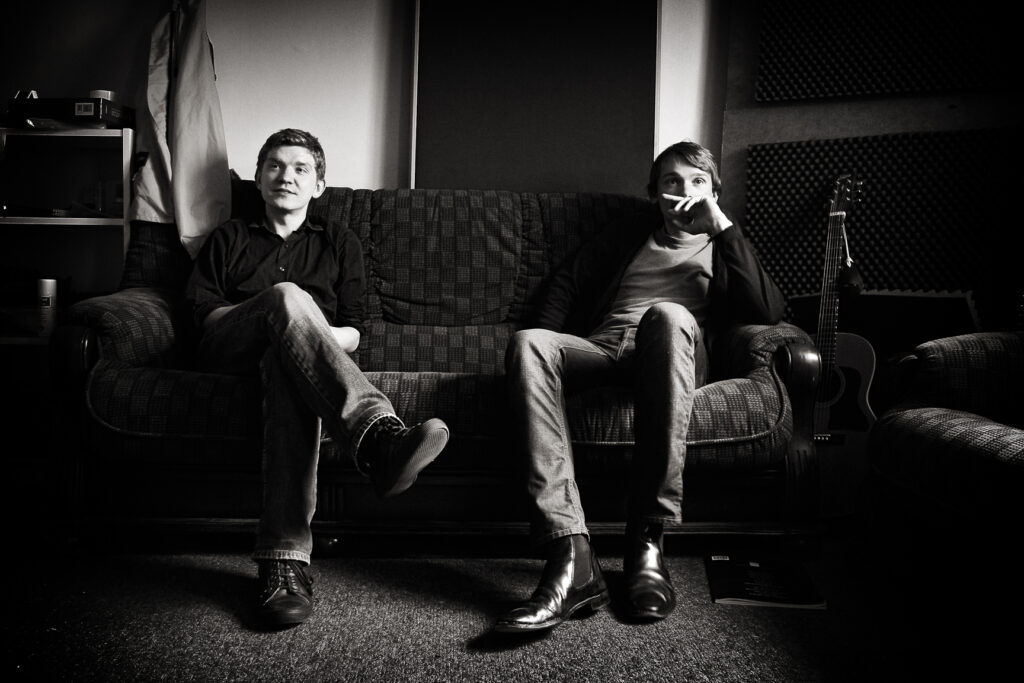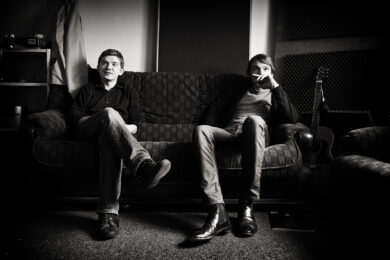“Comeback” double-album Field Music (Measure) is wowing critics and human beings alike. The brothers Brewis recorded this varied head-trip in their Sunderland studio after taking a three-year hiatus from the band to be The Week That Was and School Of Language. The Quietus had a natter with David Brewis about sibling relationships, their home town and Led Zeppelin.
Reviews of this album are excitedly citing the entire off-piste canon, throwing around names like Prince, Kate Bush, Talk Talk, 10 CC, Roxy Music, Yes, etc. Sure beats being compared to The Kooks. Which of these make sense to you and which do you think are totally nuts
David Brewis: Well, everything there except Yes makes sense to me, but that’s because I put them in the press release. We’ve stolen ideas from them all.”
What are the differences between the two of you, in songwriting/musical terms and in personality terms?
DB: Peter’s songs tend to be a little more “musical” than mine – partly because he writes a lot on piano and partly because he has a more solid grounding in theory than I do. You could broadly say that Peter’s songs flow and mine have edges, though there are plenty of examples where that’s not the case. Lyrically, I think Peter tends to be a little more guarded than I am and sometimes seem to have an abstract philosophical bent. Peter’s sociable but quite private, although he’s terrible at hiding what kind of mood he’s in. He’s also not very self-confident, which I find strange as I’ve got so much first-hand evidence of how brilliant he is. In those respects, I’m the polar opposite; mostly very unsociable but fairly open about what I’m thinking and fairly confident about most things.
How has growing up in Sunderland shaped you?
DB: We’re probably not anyone’s idea of a typical mackem but we are very much a product of the town – it’s a classic post-industrial town; not big enough or culturally vibrant enough to have thrived after most of the traditional industries collapsed in the 70s and 80s, but too big to have become a ghost town like lots of the smaller mining towns in County Durham especially. Sunderland has been in the shadow of Newcastle for centuries and it’s a very isolated, insular place in a lot of ways. Conversely, that isolation and insularity can make for strong communities, though a lot of that has been corroded by the inevitable social and health problems which come from such high unemployment.
“Peter and I are oddities in a way – we’re very much from a working-class background but our parents were the academically-bright kids of really big families, the only ones to go to grammar school, and they really worked hard to take advantage of that opportunity. In an old fashioned sense, they were desperate to “make a better life” for me and Pete – not in terms of material possessions – more as in having opportunities that they wouldn’t have had, like going to University and having the time and space to be creative if we wanted to be.
At the same time, our parents took absolutely no crap from us! We were both really smart kids but there would have been hell to pay if our parents ever thought we were slacking. All of those things are viscerally present in our music – a mix of thoughtfulness and imagination with pragmatism. It really pisses me off when northern, working-class bands feel compelled to go on like laddish idiots (usually because that’s what magazines want to write about) and do everything possible to hide or disparage their education. I don’t see why someone can’t be northern and working-class and be intelligent and care about art.
It’s perhaps surprising to learn you’re Led Zeppelin fans…
DB: Sure, apart from their Tolkien stuff. The thing with Zeppelin, the first band we really got into when we were first starting to play, was the dynamic between them as a band and the way they arranged a small number of instruments in an almost-orchestral way. They were phenomenal musicians – we’re constantly trying to play more like them, especially John Bonham. Plus, their recordings have a real sense of space – you can always hear the sound of the room they’re playing in and that’s something which has shaped our taste in recordings. (Though I have a soft spot for ‘Dirty Mind’ by Prince which sounds like everything was plugged straight into a mixing desk – no air movement involved). Obviously there are lots of things about the rock music of that era (and most eras, to be fair) which are embarrassing or outmoded – the misogyny, in particular, is something I struggle to ignore. However, the great thing about making music now, in an era of abundant back catalogue and few genre boundaries, is that we can pick and choose the things we like and leave the things we don’t. We’re definitely not indie purists.”
Do you think Field Music sound like 2010?
DB: I don’t think our records could have been made at any other time. Sometimes I think of us as the next step for the home-producing artist/auteur, taking on what people like McCartney or Emitt Rhodes or Todd Rundgren or Prince did. Are we “Prog-Pop”? Well, we like pop music and we are, in some sense, progressive – by which I mean there are lots of interesting things you can still do with pop music, it doesn’t have to be tired rehashing of old ideas. Pop music can encompass anything, which is what makes it so interesting. It’s not like other areas of music which define themselves in some ways by what they leave out. Anything can be pop music.



